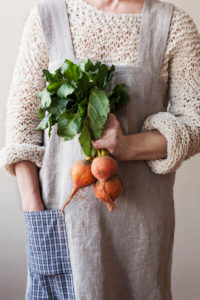What the founder of this sustainable textile company has learned about local community building
 December 21, 2017
Category: Featured, Medium, Purpose
December 21, 2017
Category: Featured, Medium, Purpose
Disclosures
This is a guest post by Kitchen Garden Series founder Heidi Barr.I have been thinking about sustainability and environmental issues as far back as I can remember.
When I discovered Henry Got Crops (one location of the Weavers Way co-op network) offering a CSA less than two miles from my urban Philadelphia home, I immediately became a working shareholder. I also donate to the Weavers Way farms and the East Park Revitalization Alliance, both groups growing food in Philadelphia within a few miles of my home studio.
Before I knew it, the experience inspired me to step away from my career as a costume designer and start a new business, The Kitchen Garden Series, a line of kitchen textiles made with natural and reclaimed materials and sold to support urban agriculture.
In a world of confusion about what it means to be environmentally responsible, I strive to be transparent and employ the most sustainable business practices available to me. Being a part of the textile industry, albeit on a small scale, makes sustainability a big challenge.
In the first year of business, I used exclusively reclaimed materials. My signature look comes from upcycled men’s shirts and vintage flour and seed sacks and when I began working with linen, it came from curtains rescued from a theatrical production by the Resource Exchange. When those ran out, I searched for a new source of linen on it’s way to the garbage stream and now get remnants from three other small businesses, all in Lithuania.
As The Kitchen Garden Series grows and I source new yardage, I use natural, unbleached, undyed fiber to reduce environmental degradation during production. All of these practices help make The Kitchen Garden Series part of the solution to some of the many environmental challenges facing the textile industry.
Responsibly sourcing materials is simply one important piece of a sustainable business model. Connecting to likeminded communities — local and global — completes the puzzle. As the sole proprietor of The Kitchen Garden Series, I can say it would be impossible without a lot of other talented hard-working people:
- There are the growers I support, who inspired me to begin, and keep me going by feeding me and leading by example with their fearless work in their communities.
- There are the farmers market managers who give me space to sell my goods (Swarthmore, Collingswood, Kennett Square, Christ Church, Malvern, Downingtown) and all the people who come out weekly to support local products.
- There is the local print shop (Fireball), the local silkscreen shop (Press and Release) and the many collectors rescuing vintage textiles and carting them to flea markets or posting them online.
- There are my friends who are natural dyers and artists and better with technology than I am who help so generously when I am up against the limits of my knowledge.
- There are the shopkeepers who carry my goods — many of whom I consider friends and sometimes invite me in for special events in their amazing stores (Cuttalossa, Isabella Sparrow, Moon + Arrow, Marché, among others).
- There is the sew shop in Allentown that now produces my three most-popular items in a comfortable, family-owned shop offering fair wages and good working conditions for a handful of local seamstresses.
All of these relationships demonstrate how choosing a sustainable business model has a positive ripple effect. Our choices in business can make us part of the solution to environmental issues, contribute to our local economies and raise awareness in the broader community. Our connections to other local sustainable enterprises can exponentially increase that influence. In addition, these practices make me happy and the urban growers I support make my life more delicious!
Trending News










